
Press Enter to search

How To Write a Resume Objective For a Career Change
Not sure if an objective still belongs on your resume? Here are recruiter-backed tips on how to write an effective resume objective in 2024, with specific advice for career changers.
2 years ago • 8 min read
Job hunting is never easy, but it’s even harder when you’re changing careers. That’s where a modern resume objective comes in. It’s a concise statement at the top of your resume that contextualizes your past experience, signals your intent to change careers, and highlights relevant skills or achievements.
If your first question is, “aren’t resume objectives outdated?” then the answer is yes, but they don’t have to be. Here’s how to write a modern, recruiter-friendly resume objective , with specific advice for people aiming to change careers in 2024 .
Resume objectives vs resume summaries
First, before we go any further, let’s address the elephant in the room: Yes, traditional resume objectives are outdated and do not belong on a modern resume.
There are many reasons why, but it basically boils down to the fact that hiring managers want to know what you can do for them, and resume objectives typically focus on what a company can do for you.
But, while traditional resume objectives might be outdated, a modernized version can be a powerful tool for those looking to change careers. This new and improved version, often called a 'resume summary,' can showcase your professional highlights, relevant skills, and your intention to shift careers.
In short, resume objectives are out, and resume summaries are in. So, for the rest of this article, when we’re talking about your resume objective, we’re really talking about your new and improved resume summary.
Do I need a resume objective for a career change resume?
If we're talking about a traditional resume objective, then No. It’s better to remove it and take advantage of the extra space to include more relevant work experience and hard skills.
But if we’re talking about a resume summary, then Yes!
When you’re changing careers, it’s important to include your new/proposed job title somewhere on your resume to get past ATS , and a resume summary is a great place to do that. A summary objective can also help explain to hiring managers why you’re applying for a position that doesn’t directly align with your experience and helps highlight relevant qualifications or recent training.
How to write a career change resume objective
- Put your objective at the top of your resume, just below your contact information, under the optional title of ‘ Summary .’
- Include the title of the job you’re applying for and the company name.
- Mention any relevant skills or experience you can bring to the role, including any impressive accomplishments you want to highlight.
- Keep it brief — a resume objective can be as short as a single line.
- Tailor your objective to the job you’re applying for by mentioning relevant transferable skills.
- Check whether you’ve hit the mark with our free Targeted Resume tool.
Now let's delve into more details about what your resume objective should (and shouldn’t) include, with examples you can use to create your own career change resume objective.
Examples of resume objectives for a career change
A resume objective doesn’t need to be complicated. A single line explaining what role you’re applying for can be enough to bypass ATS and indicate your intent to a hiring manager. For example:
To become a graphic designer at Kool Grafix, Inc.
When changing careers, it can be useful to highlight any similar experience or transferable skills upfront. For example:
To bring my two years of volunteer experience to the events coordinator role at Inner City Events.
A longer summary-style objective is ideal for career changers who want a little more space to contextualize past experience and highlight any standout accomplishments:
Ex-Sales Associate transitioning into an Administrative Assistant role. Diverse experience resolving customer inquiries, opening accounts and managing schedules. Over 3 years of experience managing teams of 5-15 people. Exceeded sales target by 95% in 2022, winning the Business Store Award.
Follow these examples to write your own objective, or try out our Resume Summary Generator to help get you started.
Do’s and don’ts of writing a resume objective
Let’s start by taking a look at what (and what not) to do when writing a resume objective for a career change.
Don’t: Write a traditional resume objective
Here’s an example of a fairly typical resume objective that recruiters don’t want to see:
To use my excellent people skills to obtain a position that will allow me to grow professionally and reach my fullest potential.
Recruiters don’t care about what you want from them, so don’t focus on that, and avoid buzzwords and vague long-term career aspirations.
Instead, focus on your acomplishments and what you bring to the table. To be effective, your resume objective should highlight relevant experience, quantifiable achievements, and transferable skills. To find out if your resume does just that, upload it to the tool below — it’ll give you a detailed analysis of your career change resume objective and suggestions for improvements.
Do: Be concise and specific
A good resume objective should focus on your specific, short-term professional goals. It should include:
- The specific position and company you’re applying for
- The key skills or experience you will bring to the role
That’s it! There’s no need to dive into who you are as a person, why you need a job right now, or what you want out of life.
Here’s an example of a brief but effective resume objective:
To become a sales representative at Elite Motors.
If you want to use your resume objective to highlight transferable skills, you can add more to it — but not too much. For example:
To bring my 5 years of experience in project management to the operations manager role at West Coast Pipeline.
The key is to focus on what rather than why — what job you’re seeking, what company you’re applying to, and what makes you stand out from the rest.
Do: Emphasize metrics and quantifiable achievements
Use metrics and quantifiable achievements to enhance your new resume objective. This approach is particularly effective for career changers as it provides concrete evidence of your skills and accomplishments.
For example, instead of simply stating your previous role, mention specific achievements such as “Increased sales by 30% over two years” or “Led a team that successfully completed a major project under budget and ahead of schedule.”
Do: Include a summary of your key qualifications
A summary-style resume objective should:
- Briefly outline your past experience
- State any new or relevant qualifications
- Highlight a few transferable skills or notable accomplishments
Here’s a basic resume summary format you can adapt to fit your situation:
Ex-[Current Job Title] transitioning into an [Future Job Title] role after [completing X relevant certification] and [relevant accomplishment]. Diverse experience [doing X transferrable skill in new job], [Y transferable skill in new job] and [Z transferable skill in new job]. Over 5 years of experience managing global teams of 5-20 people and working with C-Suite executives. [Describe one significant accomplishment in the format of Action Verb + Accomplishment + Metric].
Do: Research and incorporate current industry trends
When crafting your resume objective, demonstrate your up-to-date knowledge and commitment to your new field by researching current trends in your target industry, and incorporating these into your statement.
For example, if you are transitioning to a tech role, mention your familiarity with emerging technologies and new software.
For example:
Ex-project manager transitioning to a software development role with a keen focus on emerging technologies in cloud computing and machine learning. Recently completed a specialized course in AI-driven development.
Do: Keep your resume objective updated and current
As you progress through your career change, it's crucial to keep your resume objective updated, so it accurately represents your current capabilities. Regular updates show your commitment to continuous learning and professional growth, which is particularly important for career changers actively acquiring new skills and qualifications.
In this example, the candidate demonstrates how they have actively worked to bridge the gap between their past experience and their new career path:
Ex-project manager recently certified in SEO and digital marketing, with a background in sales management, now seeking to leverage my combined expertise in an online marketing strategist role.
How to identify and highlight transferable skills in your resume objective
As a career changer, one of your most powerful tools is the ability to showcase transferable skills. Transferable skills are competencies that are relevant to a variety of different industries and can include things like leadership, project management, communication, and analytical abilities.
By mentioning transferable skills in your resume objective, you can show potential employers why your seemingly unrelated past experience makes you a great fit for this new role.
To showcase transferable skills in your resume objective:
- Look at the job description for your desired position and compare the skills to those you've developed in previous jobs, even if they seem unrelated. For instance, project management skills in an IT role can be relevant in a managerial position in another sector.
- Showcase those skills in a way that explains their relevance to the new industry by changing the terminology to match your desired field or focusing on one particular aspect of a larger role.
- Highlight your experience with these skills using quantifiable metrics. For example, if your leadership in a previous job led to a 20% increase in team efficiency, mention it.
Here is an example of a resume objective that highlights transferable skills:
Ex-Sales Manager transitioning into an HR Manager role after completing HR CIPD Level 5 certificate. Over 5 years of experience managing global teams of 5-20 people and working with C-Suite executives.
The benefits of including a resume objective when changing careers
Wondering why you should bother including a resume objective at all? Here are a few good reasons:
To confirm that you’re deliberately aiming for a career change
If you’re changing careers, sometimes the first hurdle can be explaining that, yes, you do want this job as a software developer, and no, you didn’t apply by accident. Even a one-line resume objective can help with this — putting the title of the job you’re applying for in your objective can help your resume get past Applicant Tracking Systems (ATS) and signal a deliberate intent to change careers.
To address a gap in your resume
You can use your resume objective to address a gap in your resume and negate any potential recruiter concerns regarding your time away from work. Focus on the skills and experiences you gained during the time away by highlighting any training or qualifications you gained, and discuss how the period contributed positively to your career goals.
For example, a marketing professional transitioning to user experience design might mention completing a UX certification and engaging in freelance projects during a career break. This approach demonstrates a proactive attitude and readiness for new challenges, showing potential employers that the gap was a valuable investment in your future career.
To replace (or accompany) a cover letter
Not all positions ask for (or require) a cover letter . Even if you did write one, including a quick line at the top of your resume clearly stating the role you’re applying for can help ensure that your resume ends up in the right place.
To quickly outline your key skills and experience
Recruiters tend to briefly skim resumes rather than carefully reading each section. That means that you’ll want to put the most important information at the top of your resume where it’s more likely to stand out. Use your resume objective to pull out a few key accomplishments from your resume that you don’t want the hiring manager to miss.
Try to include skills that are relevant to the career you want to move into. if you're not sure what skills those are, search for your target role or industry in the tool below.
- Career Advice
Spread the word
How to say you work well independently on a resume (with examples), resume skill levels: what being proficient really means (and how to prove it), keep reading, how much should my salary go up when i get a new job (and tips to make it happen), how to name drop in a cover letter (without sounding pretentious), how to show bilingualism on your resume (with examples), subscribe to our newsletter.
Stay updated with Resume Worded by signing up for our newsletter.
🎉 Awesome! Now check your inbox and click the link to confirm your subscription.
Please enter a valid email address
Oops! There was an error sending the email, please try later

Thank you for the checklist! I realized I was making so many mistakes on my resume that I've now fixed. I'm much more confident in my resume now.


Build my resume
- Build a better resume in minutes
- Resume examples
- 2,000+ examples that work in 2024
- Resume templates
- Free templates for all levels
- Cover letters
- Cover letter generator
- It's like magic, we promise
- Cover letter examples
- Free downloads in Word & Docs
11 Career Change Resume Examples [& Templates]
Marketing Manager

Best for senior and mid-level candidates
There’s plenty of room in our elegant resume template to add your professional experience while impressing recruiters with a sleek design.
Resume Builder
Like this template? Customize this resume and make it your own with the help of our Al-powered suggestions, accent colors, and modern fonts.
- Career Change Resumes
- Changing Careers To Resumes
- Changing Careers From Resumes
- Career Change Resumes for Teachers
Noah breathed a sigh of relief as he found a few accounting job descriptions that intrigued him. After spending years in various financial roles and racking up some impressive creds as a financial analyst, he felt confident in this career switch. But was he as prepared to make a resume as he was for his career change?
Noah’s confidence went up when he found our library of career change resume examples and time-tested hints. Plus, he knew he’d be able to expand upon his career objective and add even more value by making a cover letter ! The notes he took while preparing his application materials even helped him navigate a victorious interview.
Whether you’re looking to change careers in accounting, teaching, or any other profession, check out our handy resources to build your own success story like Noah did!
Career Change Resume
or download as PDF
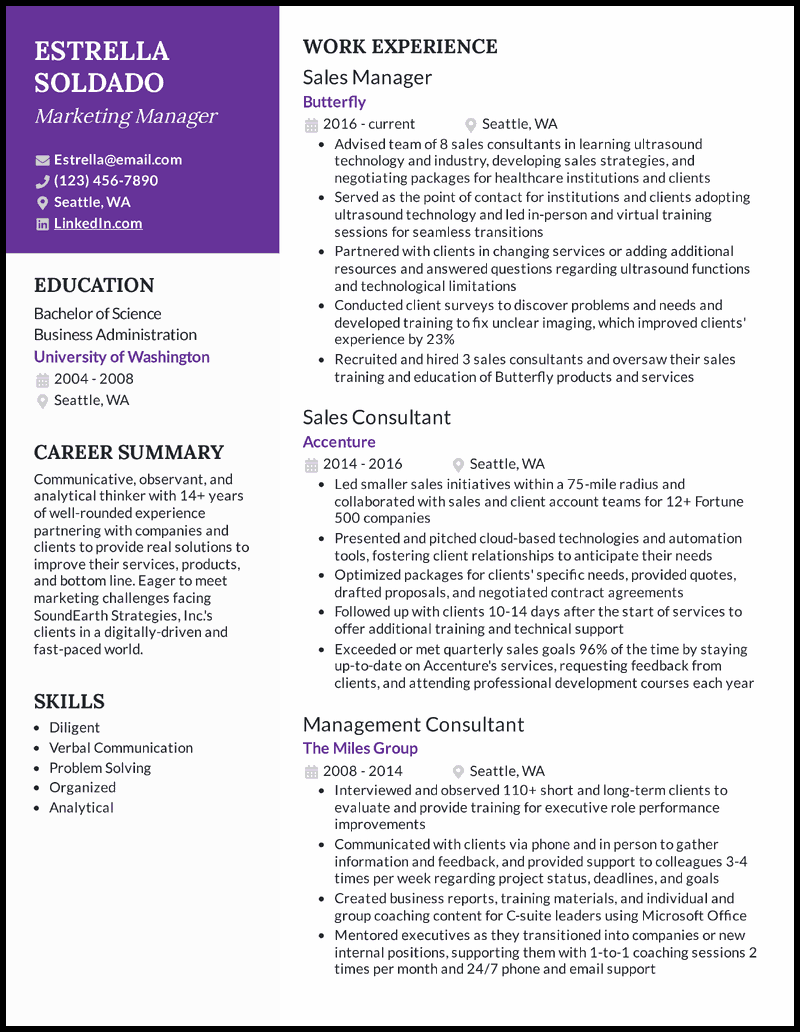
Why this resume works
- A summary merges your background with the opportunities you’re seeking. In other words, a summary demonstrates how your experience has prepared you for your new field. However, you should only use a summary if you’ve had at least 10 years of experience.
- Choosing a professional resume template and resume format can help make your resume look professional and cohesive without much effort.
Multiple Career Resume
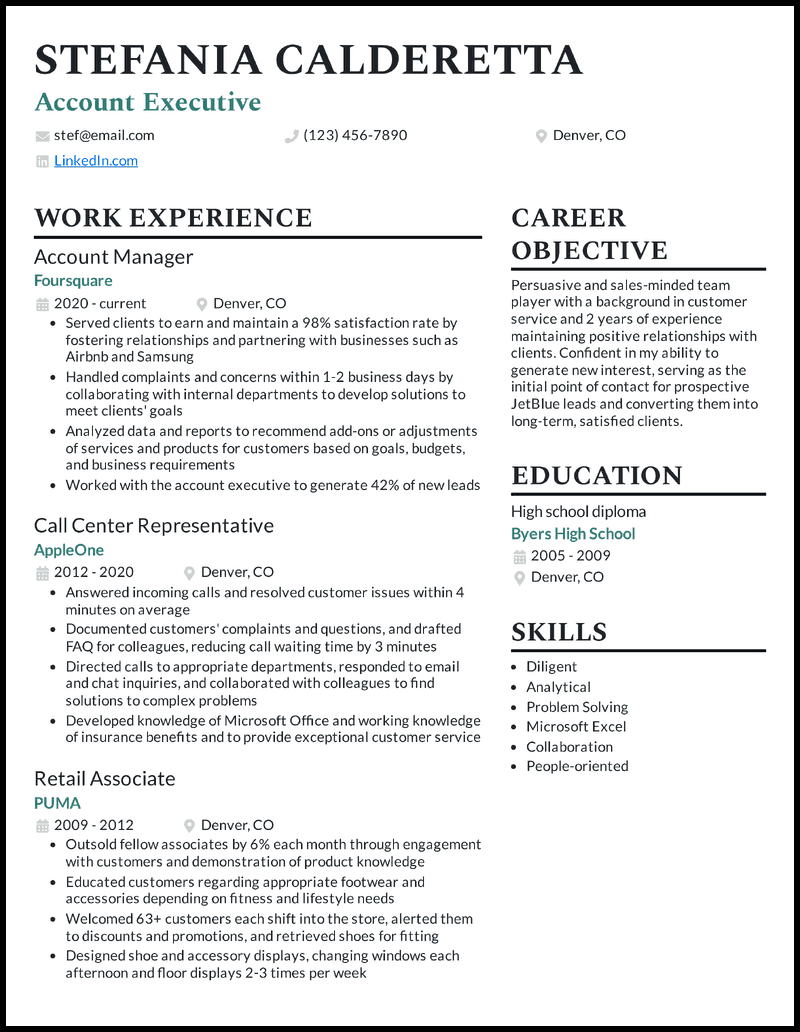
- The keywords you include will help tie your expertise together and prove that you have the right abilities for the job.
- Start by listing hard skills (aka technical, learned skills) listed in the job description. If you don’t have a lot, then simply use soft skills like “analytical” and collaboration.”
- Whatever jobs you’ve held, find a common thread between them and the new job, then sew that thread into every job experience. It’ll be a subtle but powerful tool to increase credibility despite multiple career changes.

Career Change To Accounting Resume
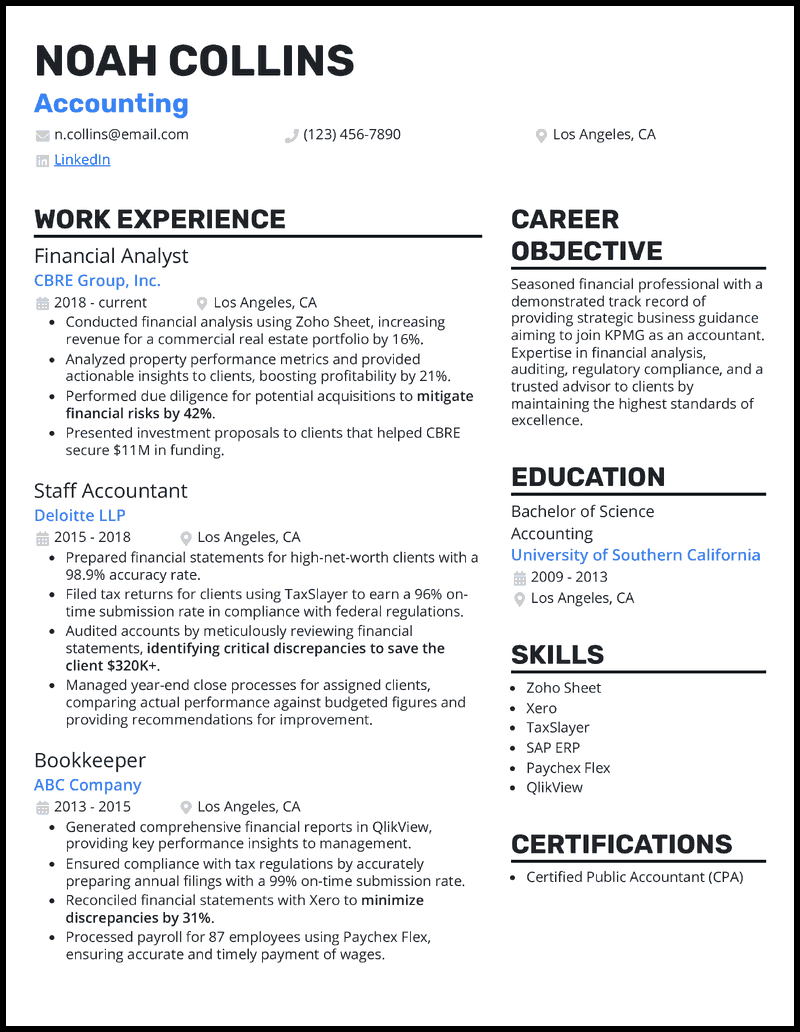
- If you’re applying to be an accountant but it wasn’t your most recent role, be sure to add a certifications section highlighting that you are a Certified Public Accountant (CPA).
Career Change To Administrative Assistant Resume
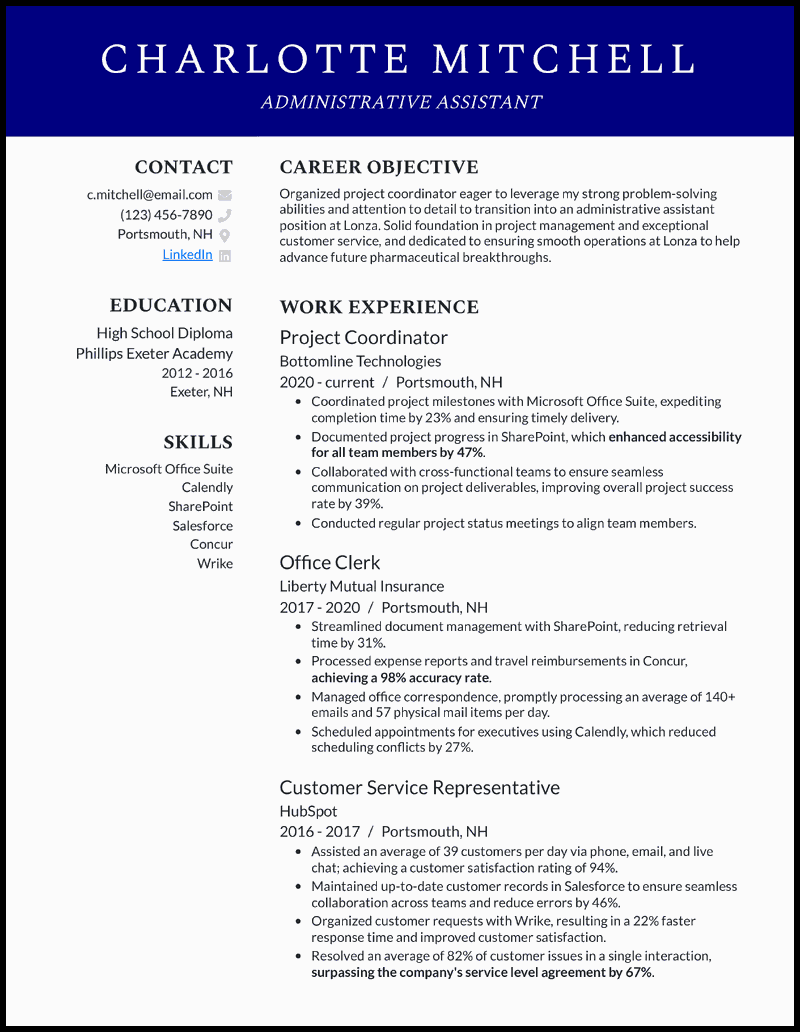
- Enhance your career change to administrative assistant resume with a short summary that shows recruiters where to draw parallels between your past experience and target title.
Marketing Manager Career Change Resume
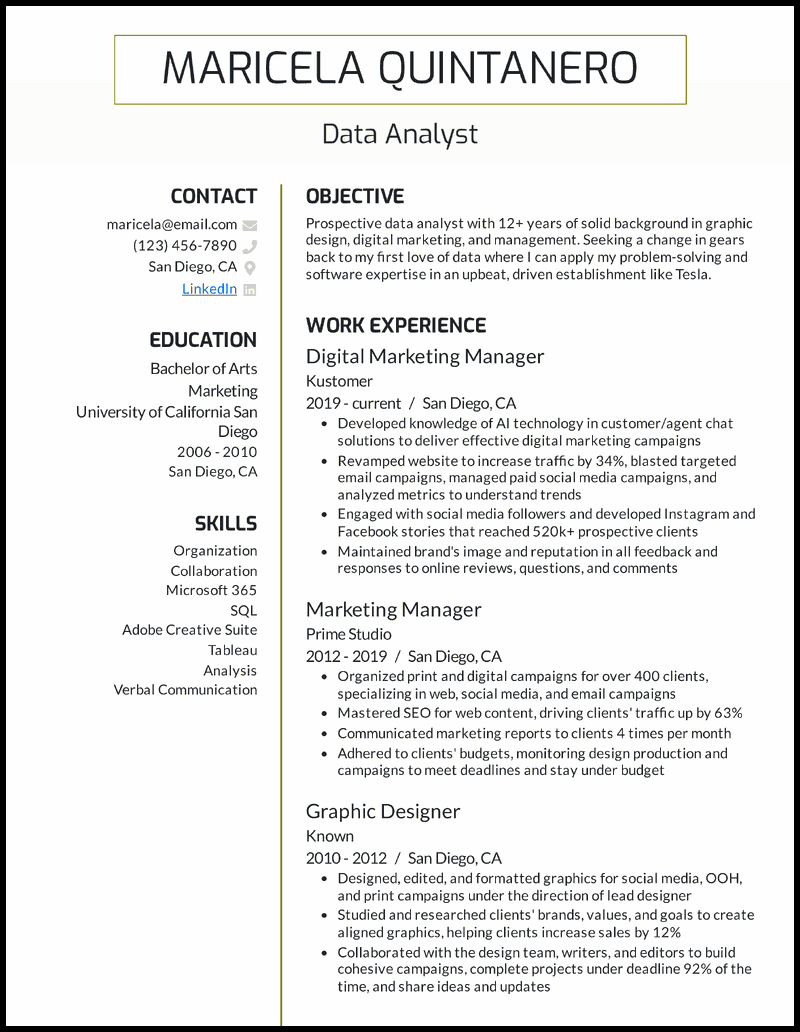
- There are numbers everywhere; look for percentages relating to your skills, like how you boosted efficiency or increased sales from last quarter. The sky’s the limit!
- If you can’t find (or don’t have access to) percentages, then use plain numbers relating to how many team members you worked with, how many clients you took on, or how many referrals you gained.
- Things like only using active verbs and avoiding personal pronouns might seem minor, but they make reading your resume easier, which is huge for recruiters and hiring managers.
- And speaking of details, always double-check your resume for proper grammar, punctuation, and overall flow.
RN Career Change Resume
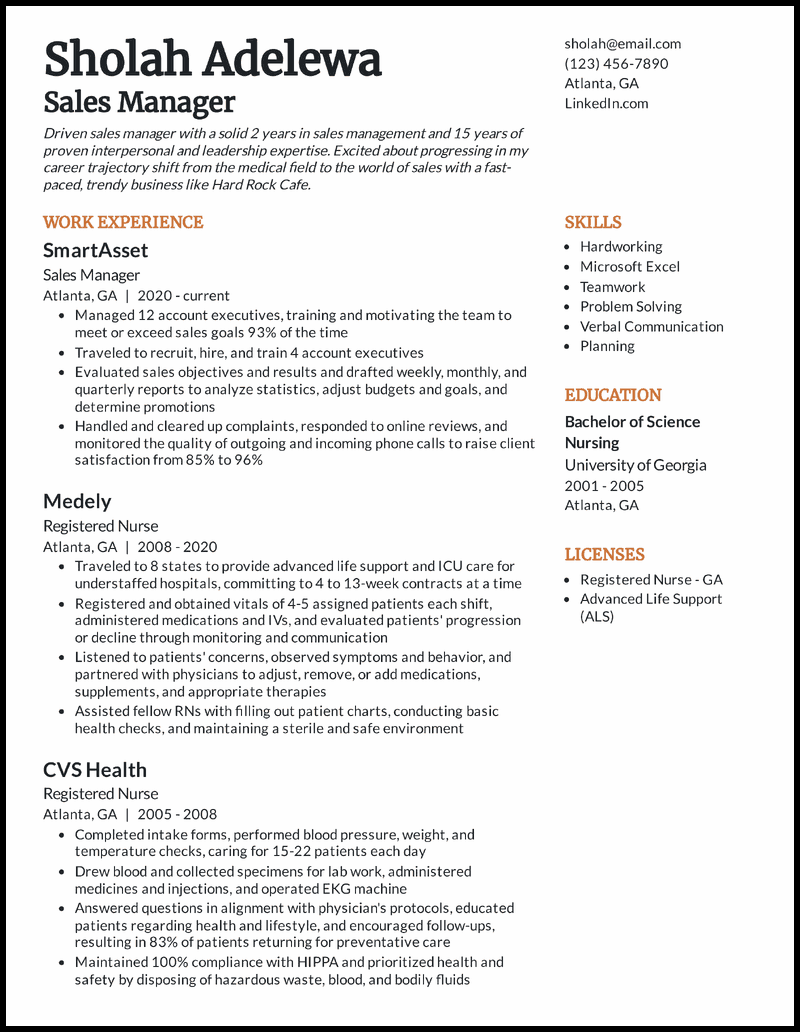
- An objective is only two to three sentences, so make sure each word packs a verbal punch by showing off your years of experience, skills, and desire for the role you’re seeking.
- For example, mentioning your adherence to HIPPA guidelines can demonstrate to hiring managers that you will stick to the rules. On the flip side, explaining how you used active listening to assist patients will show your compassion and customer service skills.
Journalist Career Change Resume

- Start by keeping your resume to a single page. Otherwise, you’ll overwhelm hiring managers (who will likely toss your resume into the recycling).
- It’s best to use reverse-chronological formatting on your resume to keep your most relevant job history at the top. While other formats are necessarily wrong, they aren’t standard, and they’re harder for hiring managers (and the ATS) to read.
- In your contact header, include your email address (make sure it’s a professional email), your phone number, and your location.
- Consider adding a hyperlink to your LinkedIn profile if you have a LinkedIn account.
Mechanical Engineer Career Change Resume
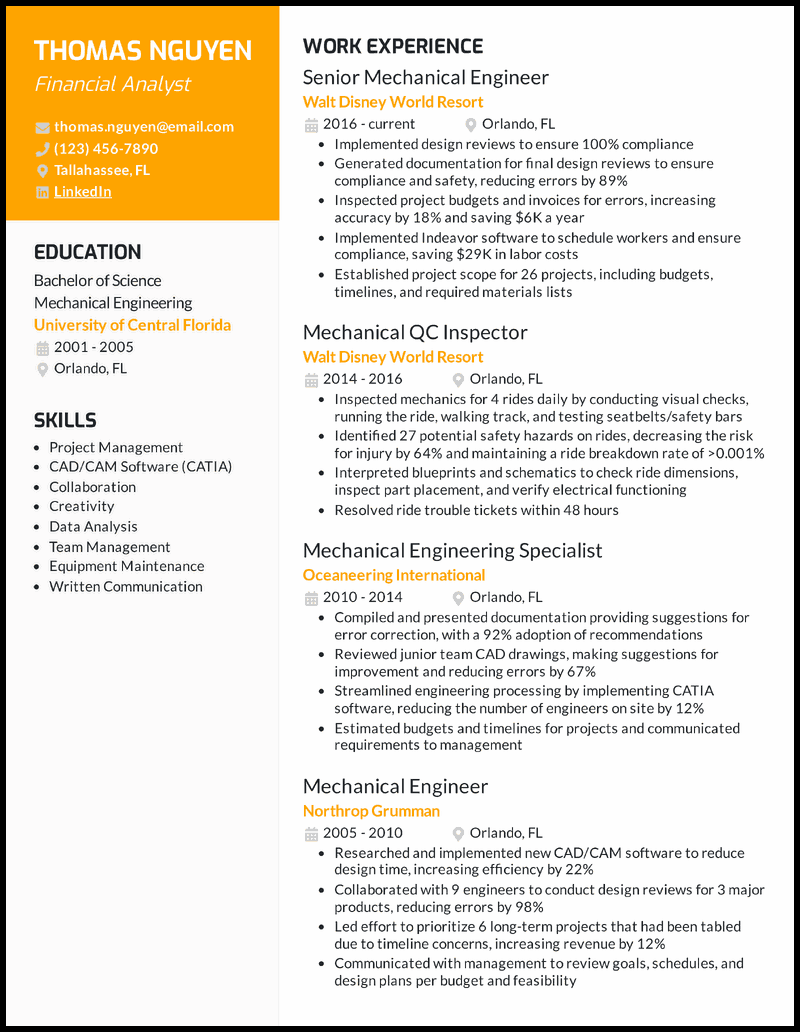
- Consider asking a friend, relative, or even a career advisor from your alma mater to scan your resume for errors and discrepancies.
- Nothing tells a recruiter you’re not the right person for the job like saying you’re great at “time management.”
- Put color in your section headers (or company titles) and your contact header. This will add visual interest without being overwhelming.
- If you’re applying to work at a conservative financial firm, you may want to stick to traditional colors rather than pastel pink or lavender.
Teacher Career Change Resume
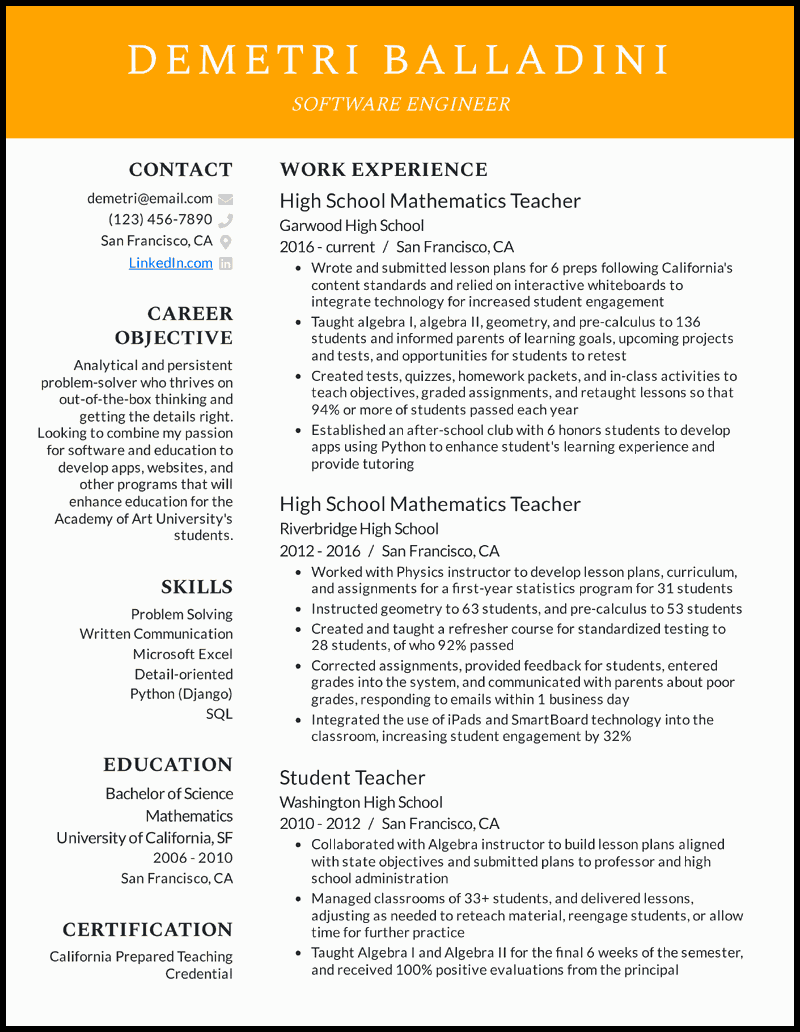
- Look for ways to connect your previous duties to the responsibilities listed in the job description.
- Many skills indirectly transfer from one job to another. Consider your collaboration skills: your ability to work well with fellow teachers will help you work on team projects at your next job.
- Of course, if you have any skills, projects, or experience in your new field, include them, and explain how you’ve mastered them in your career change cover letter .
- Using a resume template is invaluable here, as you can easily scooch sections to the side, adjust your margins, and fix your font type to give you some extra wiggle room.
Teacher to Project Manager Resume

- The work experience bullet points to occupy the largest share of your CV—no more than four bullets for each role. As for your contact info, education, skills, hobbies, and certifications, a side column will do the trick. The cherry on top is restricting the entire resume to one page.
Teacher to Human Resources Resume

- But more importantly, mention the relevant transferable skills you bring to this entry-level role, a requirement Elijah executes well in his teacher to human resources resume. Better yet, let your bullet points show how you used these proficiencies in previous teaching roles.
Related resume guides
- Engineering

Career Change Resume for 2024 [9+ Examples]

Thinking of switching careers?
It might feel a lot like taking a leap of faith.
You’re stepping into the unknown - that alone takes a lot of courage and determination.
You might even feel like a recent graduate all over again.
You have 0 experience, entering an entirely new field, competing with people who’ve been doing it forever!
That sounds pretty scary.
But here’s the thing:
As long as you’re armed with the right resume, the transition can be a piece of cake.
And luckily, we’re here to help and guide you through the process.
So, if you’re thinking of breaking into a new career industry, be sure to read on.
- How to pick the best resume format for a career change
- How to create a skill summary and wow the recruiter
- How to show off transferable work experience
- 3+ other ways to impress the recruiter (even if you have 0 relevant work experience)
Choosing the Best Career Change Resume Format

A big part of creating an effective resume is choosing the right resume format to tell your story with.
You need to structure your resume in a way that best shows your transferable skills and experience.
And when it comes to switching careers, the combination resume format does that best.

Here’s why:
This format places equal emphasis on skills and important work experience .
This way, you can show you have the right industry transferable skills , even if you haven’t had the actual job title.
The format is ideal for people:
- Making a career change with transferable skills or work experience.
- With some employment gaps.
- With a diverse range of skills and experience .
- Applying to both creative and traditional roles.
And here’s what you include within this format:
- Contact information
- Resume objective or summary
- Skills summary
- Work experience
- Certification
Now, we’re going to go over each of those sections and explain how to write them step-by-step.
Here’s what you need to know:
How to Add Your Contact Information the Right Way
Your contact information is arguably the most important part of your resume.
Even if you’re the most qualified person in the world, it’s not going to matter much if you misspell your email and the HR manager can’t contact you.
So, here’s what you should include in this section:
- First name, last name
- Phone number - Make sure to include your country code if you’re applying outside your country.
- Email address - Something professional like [[email protected]].
- Location - The company needs to know if you’re located in the region or if they may have to sponsor your relocation.
- Title - Either your current professional title or your new desired one. We’d recommend including the job title you’re applying for word-for-word.
Once you’re done, we’d recommend that you double-check, even triple-check everything. You wouldn’t want to miss your chances of landing the job because of a typo, would you?
- Got an online portfolio? You can also mention the links here. For example, if you’re a developer, you can include a link to your GitHub profile. If you’re a writer, a Medium link, and so on...
All clear? Good!
Now, let’s cover how to write a successful career change resume objective or summary.
Impress the Recruiter With a Career Change Resume Objective or Summary
So you’ve got your contact details down.
Now, you need a reason for the HR manager to continue reading the rest of your resume.
So, how do you get the recruiter to stop and read your career change resume when they only look at resumes for 6 seconds on average?
The answer: by using a resume objective or summary.
Both of these sections explain why you’re the best person for the job and act as a preview to the rest of your resume.
Here’s how the two differ:
Your resume summary shows your best accomplishments that are relevant to the job you’re applying for.
Your resume objective highlights how your current skills are relevant and will transfer to your new position.
As someone going through a career change, you can include either one.
But as a rule of thumb, if you were working in a related field and have some transferable skills, go for a resume summary.
On the other hand, if you were working in a completely unrelated field, go for a resume objective.
Check out these examples to get a better idea of what both of these might look like:
Career Change Resume Summary Example
- “Customer support specialist with over 4+ years of experience in over-the-phone technical support looking to leverage communication skills as a Sales Agent at Company XYZ. Excellent track record of delivering quality support, with an average rating of 4.6/5 over the past 2 years.”
A career change resume summary helps the HR understand how your skillset from your previous job can translate into your new one.
In that case, it’s best to mention:
- Your current relevant skills or experience.
- How your background can help you excel at the current job.
Career Change Resume Objective Example
- “Organized and hard-working employee looking to join XYZ as a marketing assistant. Looking to take advantage of my skills in Photoshop, graphic design, and creative copywriting to help XYZ with their marketing efforts.”
See the difference here?
Even though the person doesn’t have any relevant work experience, their resume objective still shows how their skill set is relevant to the new job.
Show Off Your Know-How With a Skills Summary Section
Your resume summary / objective is only an introduction. Now, you need to show the HR what you’ve got.
To do that, you need a good skills summary section.
Skills summary is a must-have section for just about any career change resume.
It puts more emphasis on your skill-set, as opposed to your work experience. This allows you to show how you’re a qualified candidate, even though you haven’t done the job before.
Here’s what a sample skills summary section might look like for a front-end developer.
Career Change Resume Skills Summary Example
- Built an online personal portfolio and resume website using HTML, CSS, JS.
- Created an online JS/jQuery quiz game that takes multiple answers and shows results to the user.
- Built a beautiful weather app with Angular 8 from scratch, designed UI with Sketch.
- Created responsive website templates (that are also mobile friendly) using modern CSS techniques and JS libraries.
- Worked with design and development groups to create applications from mock-ups in Sketch, Illustrator, and Photoshop.
- Familiar with Git, XDebug, and Chrome Developer Tools.
- Debugged over 10 JS web apps for a SaaS project.
Simple enough, right?
You list out each of your key skills, and then back it up with how you’ve used it in the past.
Now, you might be thinking, “what about the work experience section?” Do I just skip it, and use a skills summary instead?
Nope - you still need to list your work experience.
In this case, though, you’d want to use it to show off your transferable skills. Here’s how:
Use Your Work Experience to Show Off Transferable Skills
Let’s take a different example and say you’re moving from a job in sales to copywriting.
A resume you’d use for sales compared to a more creative field like copywriting is probably going to be a bit different.
But what do both of the roles have in common?
Well, for one, they both require you to have excellent communication skills. You also need to be good at understanding your target market and conveying complex information in simple language.
And that’s the common thread you want to focus on in your work experience section.
So, when listing your previous jobs, think of some transferable skills that you bring to the table that are going to be relevant.
Even unrelated jobs have some universal skills that are helpful everywhere.
To give you a better idea of what we mean, let’s look at some examples:
Sales Executive
Company X - 11/2016 - 04/2019
- Created and presented pitch deck that secured a $500,000 deal - largest for Company X to date.
- Boosted sales for the most underperforming product by 40% by developing helpful and instructional material for prospects.
- Created and edited sales materials, scripts, and technical documents for accuracy and consistency.
Here’s what’s done right:
- Shows transferable skills and achievements.
- Highlights only the parts from the experience that are related to the new role.
While the above example doesn’t talk about product descriptions or ads, communication materials and sales scripts do show that the candidate can write.
So, for a copywriting position, it’s going to be relevant and worth mentioning.
Now, compare that to the career change work experience below:
- Cold-emailed 100+ prospects daily.
- Closed 14+ deals in 2019 so far.
- Hit and exceeded company KPIs for the past 2 years in a row.
Sure, this example is good. But only if the candidate is applying for a sales job.
For copywriting, though, none of the skills mentioned are going to come in handy.
So, when listing previous job positions, you should focus only on what’s relevant.

Now that you know how to properly list work experience, let’s move on to the next section: Education.
Make Your Education Section Shine
Your education section is going to be an important requirement for just about any position above entry-level.
Listing education on your resume is pretty straightforward.
All you have to do is list your latest educational entry (e.g. college degree), and then include all the important stuff below it.
For example, you can include things like:
- Name of degree (Minor - optional): e.g. B.A. International Business Administration.
- Name of educational institution: e.g. University of Groningen.
- Years attended: e.g. 2015 - 2019.
- Location of the program (optional): e.g. Groningen, Netherlands.
- GPA (optional): 3.84 (only include if you excelled).
- Courses that are relevant to the job (optional): e.g. Advanced Business Finances.
- Exchange programs (optional): e.g. exchange program in Florida, U.S.
Here’s what the full listing for this educational entry might look like:

You might be wondering, what if I don’t have the right education for the job? Maybe, you have an M.A. in Philosophy, but you’re applying for a job in marketing. Do you still list it?
The answer is a definite yes.
Even if the degree is not relevant at all, it still shows that you’re passionate about learning and education.
In some cases, you might even be able to show off some transferable skills with your degree.
Let’s say, for example, you have a B.A. in English Literature , and you’re applying for a job in marketing.
You could stress on how your degree gave you amazing writing skills (a must-have for most marketing roles), like so:
B.A. in English Literature.
University XYZ - 2014-2018
- Excelled in creative writing courses
- Part-time as a reporter for the university website
PS - Do you still have some questions on how to list your education section? Maybe you’re wondering what else you can include? Check out our full guide on how to list education on a resume with 13+ real-life examples.
Done with your education section? Awesome!
This brings us to the next section on your career change resume.
How (and Why) to List Skills On a Career Change Resume

When it comes to the skills section, what most recruiters want to know is if you can actually do what the job ad asks for.
And like with the other sections till now, relevance is key.
You should only ever list skills that are appropriate to the job you’re applying for.
To find out what’s relevant, start by scanning the job listing.
Most job ads usually include a list of requirements or skills they expect for a good candidate to have.
So, all you have to do is mention those exact skills on your resume.
Let’s take a look at an example.
Career Change Resume Skills Example
Assuming the job ad is for a junior front-end developer who has:
- 2-4 Years of professional experience using JavaScript, CSS, and HTML.
- Up to 1 years of visual design experience focusing on strong UX/UI.
- Good communication skills and team-player
You’d want to list the following skills:
- Communication Skills
- Team-Player
So, all you have to do is mention these skills, and you’re good to go!
- Not sure which skills are a must-have for your role? Check out our complete list of all must-have skills for any given field or position!
Showing Career Certifications on a Resume
When you’re switching careers, certifications are an amazing way to show you’re serious about your craft.
This shows you’re willing to put in the work and that you’ve already taken the first steps.
When listing certifications though, make sure they’re relevant to your field.
For a marketing role, here’s what that might look like:
- HubSpot Inbound Marketing Certified, 2019.
- Google Analytics Individual Qualification, 2018.
- SEMrush Content Marketing Toolkit Course, 2018.
And here’s an example done wrong:
- TechCamp Python Bootcamp, 2019.
- Udemy JavaScript 101 Course.
For a marketing role, those certificates are completely irrelevant and aren’t even in the same field.
While they might be impressive on their own, that doesn’t mean they make you a better marketer.
Listing Personal Projects
Another great way to show that you’re the right person for the job is to list personal projects.
This can be just about anything:
- Founding a sports team in university
- Project you did for business class
- A Part-time online store you created on Etsy
- Passion-project for wood-working
- And whatever else you love (that’s relevant for your new career)
Pretty much anything that can make up for your lack of experience in the field counts.
But of course, keep in mind that your projects should be relevant to your new job.
Getting into coding? Here’s what your projects section could look like...

Make sure to stick to relevant projects, though.
The HR manager cares about your CODING experience, not about the fact that you started a basketball team in college.
Now, compare that to:
- Excelled in Anthropology and Archaeology classes at University X.
- Self-taught knitting pro.
You shouldn’t list projects just for the sake of standing out or filling up space.
The more irrelevant information you mention in your resume, the more likely it is for the recruiter to accidentally skip out on all your must-have sections.
- Still have some space on your resume? You can also include the hobbies & interests section. Check out our guide to learn how (and why)!
How to Write a Career Change Cover Letter
Done with your resume?
But wait, before you get too excited - you’re still not done.
You need to back up your resume with a career change cover letter.
And no - it’s not like the usual cover letter you’re used to writing.
When you’re switching careers, you want to use your cover letter to highlight WHY you’re switching fields and WHY your skills are a good match for the new role.
To do this, make sure you bring up a ton of examples and call out any key statistics or measurable results to draw upon, if possible.
To help you craft the best career change cover letter, check out the example below:

Here’s what’s done right with this cover letter:
- Addresses the reader (i.e. “Dear Doris” or if you can’t find their name, “To Whom it May Concern.”).
- Makes it clear they want to transition into a different career (from marketing and retail sales into public relations in this case).
- Shows they’ve done the research and the letter is tailored to the company's products and brand.
- Provides specific examples and achievements (“raised more than $ 10,000 for the event.”).
- Ends on a confident note and provides a call-to-action (and where to contact them).
Think your cover letter game is lacking? Check out our complete, step-by-step guide on how to write a cover letter.
If you're thinking about a career change, and want to join a community of global professionals who are also re-designing and reframing their careers, then consider Unsettled’s Lifestyle Incubator.
Unsettled’s Lifestyle Incubator program is a 4-week highly interactive “virtual retreat” for professionals seeking to redefine their career trajectory and be more intentional about designing their next steps.
Through original workshops, weekly live sessions, practical tools, frameworks and peer-to-peer conversations with a global and diverse community of professionals, they will help you identify the core tensions between the lifestyle you want and the career trajectory that aligns your values, interests, and skills.
Key Takeaways
To recap, going through a mid-career transition probably sounds intimidating.
But if you craft your career change resume focusing on transferable skills and experience - then you’re good to go!
Just make sure you follow these main key tips while working on your resume:
- Use the combination resume format to highlight your transferable skills and work experience.
- Include all the essential career change resume sections - contact information , resume objective or summary , skill summary , work experience , soft and technical skills , certifications and personal projects.
- And while doing so, highlight only what’s relevant to your new position.
- Finally, make sure you attach a tailored cover letter to your resume and mention WHY you’re switching fields and what unique skills you’re bringing with you.
At Novorésumé, we’re committed to helping you land your dream job, every step of the way. Be sure to check out our career blog to stay up to date with the industry-leading advice and more actionable tips.
Suggested Reading:
- How to Get Your Resume Layout Right [3 Free Templates]
- How to Write an ATS Resume
- 20+ One-Page Resume Templates [Free Download]

To provide a safer experience, the best content and great communication, we use cookies. Learn how we use them for non-authenticated users.

IMAGES
VIDEO
COMMENTS
In this video, Jenn, a certified career coach, shares advice for making a career change including the best way to address it on a job application. Discover how to write a more effective resume objective when making a career transition, including tips and sample objective statements to inspire you.
Not sure if an objective still belongs on your resume? Here are recruiter-backed tips on how to write an effective resume objective in 2023, with specific advice for career changers.
Find out how to construct an impactful objective to frame your experience for a new career venture. Check out our career change resume objective examples.
11 Career Change Resume Examples [& Templates] Stephen Greet September 4, 2024. Microsoft Word Google Docs PDF. Marketing Manager. Use this template. Best for senior and mid-level candidates. There’s plenty of room in our elegant resume template to add your professional experience while impressing recruiters with a sleek design.
Include all the essential career change resume sections - contact information, resume objective or summary, skill summary, work experience, soft and technical skills, certifications and personal projects.
When writing a resume for a career change, emphasize the transferable skills and experiences you've acquired throughout your career. Understanding what to include and how to list your qualifications can help you make a positive first impression on a hiring manager.